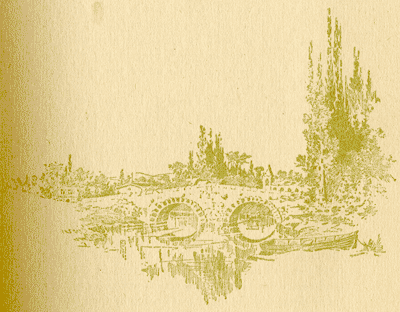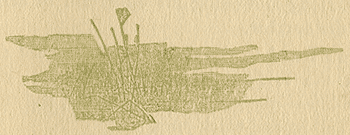| Home -> The Press in the Forest -> The Long Ago -> Chapter 2 | |||
|
The
River |
 |
||
| The river wasn't a big river as I look back at it now, yet it was wide and wandering and deep, and flowed quietly along through a wonderful Middle West valley, dividing the Little Old Town geographically and socially. Its shores furnished such a boy playground as never was known anywhere else in all the world - for it was a gentle river, a kindly playfellow, an understanding friend; and it seemed fairly to thrill in responsive glee when I plunged, naked and untamed, beneath the eddying waters of the swimming-hole under the overhanging wild-plum tree. Its banks, curving in a semi-circle around the village, marked the borders of the whole wide world. There were other rivers, other villages, other lands somewhere - all with strange, queer names - existing only in the geographies to worry little children. The real world, and all the really, truly folks and things, were along the far-stretching banks of this our river. Down by the flats, where the tiny creek widened to a miniature swamp and emptied its placid waters into the main stream, the red-wing blackbirds sounded their strange cry among the cat-tails and the bull-rushes; the frogs croaked in ceaseless and reverberant chorus; the catfish were ever hungry after dark, and the night was broken by the glare of torches along the little bridge or in a group of boats where fisher-lads kept close watch upon their corks. Far below The Dam, where the changeful current had left a wide sand-bar and a great tree-trunk stretched its fallen length across from the shore to the water's edge, the mud-turtles basked in the sun-shine, and, at the approach of Boyhood, glided or splashed to the safety of the water. The banks of the river were a deep and silent jungle wherein all manner of wild beasts and birds were hunted; its bosom was the vasty deep out upon which our cherished argosies were sent. And how often their prows were unexpectedly turned by some new current into mid-stream; sometimes saved by an assortment of missiles breathlessly thrown to the far side, to bring them, wave-washed, back to us; sometimes, alas, swept mercilessly out to depths where only the eye and childish grief could follow them over the big dam to certain wreckage in the whirlpools below, but even then not abandoned until the shore had been patrolled for salvage as far as courage held out. |
|||
 |
Let's go back to the banks of our beloved river, you and I - and get up early in the morning and run to the riffles near the old cooper-shop and catch a bucket of shiners and chubs, and then hurry on to Boomer's dam - or 'way upstream above the Island where we used to have the Sunday-school picnics - or, maybe just stay at the in-town dam near the flour mills and the saw-mills where old Shoemaker Schmidt used to catch so many big ones - fat, yellow pike and broad black-bass. We will climb high up on the mist-soaked timbers of the mill-race and settle ourselves contentedly with the spray moistening our faces and the warm sun browning our hands - and the heavy pounding of falling waters sounding in our ears so melodiously and so sweetly. Lazily, drowsily we'll hold a bamboo pole and guide out shiner through the foam-crowned eddies of the whirlpool, awaiting the flash of a golden side or a lusty tug at the line; and dreamily watch a long, narrow stream of shavings and sawdust, loosed from the opposite planing-mill, float away on the current. And here, in the dear dream-days, the conquering of the world will be a simple matter; for through the mist-prisms that rise from the foaming waters below the dam only rainbows can be seen - and there is Youth and the Springtime, and the new-born flowers and mating birds, and The River. . . . And when the sun is low we'll wind our poles, at the end of a rare and great day - one that cannot die with the sunset, but that will live so long as Memory is. Tonight we need not trudge over the fields toward home, in happy weariness, to Her who waited and watched for us at the window, peering through the gathering dusk until the anxious heart was stilled by the sight of tired little legs dragging down the street past the postoffice. We'll stay here in the twilight, and watch the fire-flies light their fitful lamps, and the first stars blinking through the afterglow; and when the night drops down see the black bats careening weirdly across the moon. . . . And we'll stretch out again on the wild grass - soothed by the fragrance of the Mayapple and the violets, and the touch of the night-wind. . . How still it is . . . and The River doesn't seem to sound so loud when your head's on the ground - and your eyes are closed - and you're listening to the far, far, far-off lullaby of tumbling waters - and you're a bit tired, Perhaps . . . a bit tired. . . . |
||
| - The Winter Stream Somehow The River never terrified me. (It did mother, however!) Perhaps it brought no fear to me because it flowed so gently and so helpfully through such a wonderful valley of Peace and Plenty. Even in its austere winter aspect, with its tree-banks bare of leaves and its snow-and-ice-bound setting, it rejoiced me. Teams of big horses and wagons and scores of men, worked busily upon its frozen surface, sawing and cutting and packing ice in the big wooden houses along the banks. Always there was enough wind for an ice-boat or a skate-sail, or to send a fellow swiftly along when mother-made promises were forgotten and an unbuttoned coat was held outstretched to catch the breeze. At night the torches and bonfires flickered and glowed where the skaters sent the merry noises of their revelry afloat through the crisp air as they dodged steel-footed in and out among the huts of the winter fishermen. Perhaps I loved the winter river because I knew that beneath its forbidding surface there was the life of my loved lilies, and because I knew that all in good time the real river - our river - would be restored to us again, alive and joyous and unchanged. One day, when first the tiny rivulets started to run from the bottom of the snow-drifts, The River suddenly unloosed its artillery and the crisp air reechoed with the booming that proclaimed the breaking-up of the ice. Great crowds of people thronged the banks, wondering if the bridge would go out or would stand the strain of pounding icecakes. The unmistakable note of a robin sounded from somewhere. Great dark spots began to show in the white ice-ribbon that wound through the valley. The air at sundown had lost its sting. So day by day the breaking-up continued until at last the blessed stream was clear - the bass jumped hungry to the fly - the daffodils and violets sprang from beneath their wet leaf-blankets - and all the world joined the birds in one grand song of emancipation and joy. - The Big Bend Above the town, just beyond the red iron bridge, the river made a great bend and widened into a lake where the banks were willow-grown, and reeds and rushes and grasses and lily-pads pushed far out into mid-stream, leaving only a narrow channel of clear water. To the Big Bend our canoe glided often, paddling lazily along and going far up-stream to drift back with the current. Arms bared to the shoulder, we reached deep beneath the surface to bring up the long-stemmed water-lilies - the great white blossoms, and the queer little yellow-and-black ones. Like a blight-eyed sprite the tiny marsh-wren flitted among the rushes, and the musk-rat built strange reed-castles at the water's edge. The lace-winged dragon-fly following our boat darted from side to side, or poised in air, or alighted on the dripping blade of our paddle when it rested for a moment across our knees. Among the grasses the wind-harps played weird melodies which only Boyhood could interpret. In this place The River sang its love-songs, and sent forth an answering note to the vast harmonious blending of blue sky and golden day and incense-heavy air and the glad songs of birds. And here at this tranquil bend The River seemed to be the self-same river of the old, loved hymn we sang so often in the Little Church With The White Steeple - that river which "flows by the throne of God"; fulfilling the promise of the ancient prophet of prophets and bringing "peace . . . like a river, and glory . . . like a flowing stream." |
|||
 |
|||